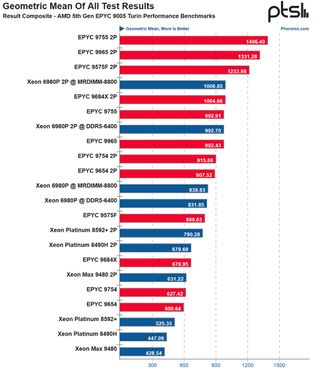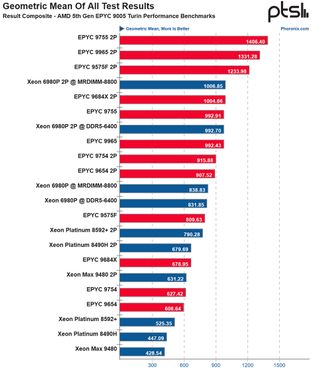Intel recently launched its 128-core “Granite Rapids” Xeon 6900P processor family, finally offering some true competition to AMD’s EPYC 9004 Genoa/Bergamo server line.
The first reviews praised Intel’s new chips, with the overall consensus being that the 6900P range successfully heralded Intel’s long-awaited resurgence in the server CPU arena.
While Intel must have been pleased with the reception to its new processors, there was an elephant in the room. The Xeon 6900P processors were pitted up against aging rivals – Genoa is almost two years old now – and AMD had its 5th Gen EPYC “Turin” CPUs in the starting blocks.

Not plain sailing
AMD’s new processors have now arrived and the first reviews for the EPYC 9575F, 9755, and 9965 Turin server CPUs are in. As was widely expected, these place AMD right back on top. As Phoronix notes in its review, “The new top-end AMD EPYC Turin processor performance can obliterate the competition in most workloads and delivers a great generational leap in performance and power efficiency.”
Phoronix added, “The tested AMD EPYC 9575F high-frequency Turin 64-core processor, EPYC 9755 128-core Turin processor, and EPYC 9965 192-core Turin Dense processors dominated across the wide variety of server, technical computing, and HPC workloads tested. The dual 128-core EPYC 9755 Turin processor was 40% faster than the dual Xeon 6980P Granite Rapids server with MRDIMMs. Even a single EPYC 9755 (and EPYC 9965) effectively matched the dual Xeon 6980P processors in this larger selection of benchmarks than what was initially run for Granite Rapids.”
In its glowing review, Storage Review said, “What sets the EPYC 9005 series apart is its ability to meet the diverse needs of modern enterprises with configurations that scale from entry-level, high-frequency models to super cache-dense chips to multi-core powerhouses. Whether real-time AI inferencing, computational fluid dynamics, large-scale data analytics, or high-resolution 3D rendering, the EPYC lineup delivers single-threaded responsiveness and multi-threaded efficiency. Advanced features like 12-channel DDR5 memory support, PCIe 5.0 lanes, and AMD’s secure, confidential computing make this series a performance upgrade and a comprehensive solution for data centers focused on the future.”
In its review, ServeTheHome said AMD EPYC 9005 Turin delivered a “transcendent” performance, noting that “AMD’s formula was simple: Increase TDP by 25%+, increase core counts by 50%, use new process technology, and update its server processors to Zen 5/ Zen 5c architecture.”
Although the site was hugely impressed by the new chips, STH’s Patrick Kennedy made an interesting observation. “In terms of competing directly with Intel for the top-end sockets vying for the top AI nodes, the situation is a bit more nuanced than one might think. At 192 cores, the Zen 5c-based AMD EPYC 9965 is great for throughput and excellent for virtualization and cloud workloads. Still, at 128 cores with the Intel Granite Rapids-AP versus 128 cores with the AMD EPYC 9755, AMD does not have the same outright leadership that it had before. Or better to say, AMD is no longer competing at the top-end just with itself.”
It isn’t only Intel that AMD has to worry about either. Arm is also challenging in the data center, and its impact in the future shouldn’t be overlooked.
More from TechRadar Pro
Services Marketplace – Listings, Bookings & Reviews
